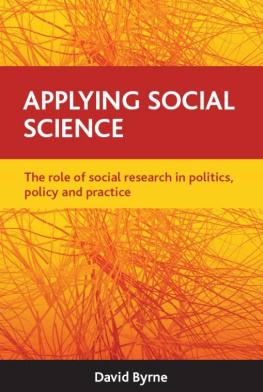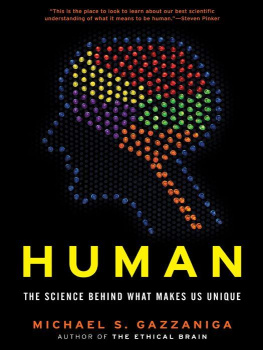Bliss - Social by nature: how sociogenomics is redefining what it means to be human
Here you can read online Bliss - Social by nature: how sociogenomics is redefining what it means to be human full text of the book (entire story) in english for free. Download pdf and epub, get meaning, cover and reviews about this ebook. City: Stanford;California, year: 2017, publisher: Stanford University Press, genre: Politics. Description of the work, (preface) as well as reviews are available. Best literature library LitArk.com created for fans of good reading and offers a wide selection of genres:
Romance novel
Science fiction
Adventure
Detective
Science
History
Home and family
Prose
Art
Politics
Computer
Non-fiction
Religion
Business
Children
Humor
Choose a favorite category and find really read worthwhile books. Enjoy immersion in the world of imagination, feel the emotions of the characters or learn something new for yourself, make an fascinating discovery.

Social by nature: how sociogenomics is redefining what it means to be human: summary, description and annotation
We offer to read an annotation, description, summary or preface (depends on what the author of the book "Social by nature: how sociogenomics is redefining what it means to be human" wrote himself). If you haven't found the necessary information about the book — write in the comments, we will try to find it.
Bliss: author's other books
Who wrote Social by nature: how sociogenomics is redefining what it means to be human? Find out the surname, the name of the author of the book and a list of all author's works by series.
Social by nature: how sociogenomics is redefining what it means to be human — read online for free the complete book (whole text) full work
Below is the text of the book, divided by pages. System saving the place of the last page read, allows you to conveniently read the book "Social by nature: how sociogenomics is redefining what it means to be human" online for free, without having to search again every time where you left off. Put a bookmark, and you can go to the page where you finished reading at any time.
Font size:
Interval:
Bookmark:
Stanford University Press
Stanford, California
2018 by the Board of Trustees of the Leland Stanford Junior University. All rights reserved.
No part of this book may be reproduced or transmitted in any form or by any means, electronic or mechanical, including photocopying and recording, or in any information storage or retrieval system without the prior written permission of Stanford University Press.
Printed in the United States of America on acid-free, archival-quality paper
Library of Congress Cataloging-in-Publication Data
Names: Bliss, Catherine, author.
Title: Social by nature : the promise and peril of sociogenomics / Catherine Bliss.
Description: Stanford, California : Stanford University Press, 2018. | Includes bibliographical references and index.
Identifiers: LCCN 2017007864 (print) | LCCN 2017019776 (ebook) | ISBN 9781503603967 (e-book) | ISBN 9780804798341 | ISBN 9780804798341 (cloth : alk. paper)
Subjects: LCSH: GenomicsSocial aspects. | Human behavior genetics. | Human geneticsSocial aspects.
Classification: LCC QH457.5 (ebook) | LCC QH457.5 .B54 2018 (print) | DDC 572.8/6dc23
LC record available at https://lccn.loc.gov/2017007864
Typeset by Classic Typography in 10/14 Minion Pro
SOCIAL BY NATURE
The Promise and Peril of Sociogenomics
CATHERINE BLISS
STANFORD UNIVERSITY PRESS
STANFORD, CALIFORNIA
For Dad
CONTENTS
INTRODUCTION
Gangsta Gene Identified in US Teens
Single Forever? Its in Your Genes
Happiness Is in Your DNA; and Different Races May Have Different Propensities for It
Sexual Orientation Not a Choice, but Is Influenced by Genetics
Everyday more and more studies emerge that tell us about the genetics of who we are. From benign qualities like optimism and intelligence to darker attributes like the tendency toward rage, sexual promiscuity, and abuse, genetics is the new trope for knowing what makes us tick. And this is no longer simply a matter of medical issues or physiological traits like hypertension, depression, and bone density. Our genetics are increasingly said to be the cause of our fundamental beliefs and behaviors; if humans consistently do it, it must be in the genes.
As familiar as it may sound, the scientific drivers of this phenomenon are new. Despite centuries of nature-nurture debates and the long history of applying genetics to behavior, technology sophisticated enough to assess genetic causes for complex human traits and behaviors only emerged a little over a decade ago. Since the mapping of the human genome in the year 2000, scientists have gone from studying single genes and single-gene disorders to multifactorial polygenic traits and common disease. More recently, a cadre of scientists hailing from a range of scientific fields have trained their attention on nondisease matters. They have decided to tackle what they see as the Big Questions of human action: choice, desires, and thought.
The avalanche of research has been expeditious. In under a decade, scientists have teamed up across vast disciplinary divides to find innovative ways to combine traditional population genetic and demographic approaches with cutting-edge genomic methods, such that any human trait that demonstrates heritability can be analyzed genomically. They have formed informal research networks and formal scientific consortia that churn through the universe of known behaviors, subjecting trait after trait to the test. Researchers have leveraged shared strengths and built novel partnerships in which disciplinary approaches can be fused and synergistically reconfigured. The result has been an all-out transformation in how we do science, how we investigate what it means to be human, and how we understand the meaning of life.
A New Science Emerges
A new the National Institute of Justice and the National Institute of Child Health and Human Development, and its leadership in the genomics of nondisease phenomena like personality and intelligence, social genomics has made its mark as the pioneer in the genomics of behavior.
At the same time, social genomics has risen to power largely under the radar of mainstream genomics. Though the science hasletters to the editor, no podcast rants, and nary an angry phone call. Social genomics is navigating the frontier seas of sociopolitical controversy with little need for a life vestbegging the question of how this new science can take hold in such a way.
Sociological field analysis provides a provocative lens
Studies have shown that autonomization has a special relationship to This can propel fields into the public eye, garnering them notoriety for intellectual bravery. A sort of new field cheer can overtake a science, giving it the momentum to slide by the usual critical firing line.
Emergent science can also take the form of intellectual movements,
In a world where sociality is increasingly formed around genomic data, all scientists share a responsibility to enlighten the public on the ties between genes and the environment. to individual and collective behavior. This book thus asks, Why is social genomics emerging here and now? What is in it for the scientists leading the way? Is it all about publicity and controlling debates? In sociological terms, what are the political, institutional, and scientific motivations that are currently hidden within the supposed legacy of relations between the natural and social sciences?
Another issue at play is todays global charge to create multidisciplinary team science. Despite the fact that disciplines and programs continue to hire their own, promote a move away from field-based expertise in the interest of tackling specific critical social problems, such as global warming and obesity.
Despite their rejection of the pursuit of science for sciences sake, it is still unclear whether team science models are truly inter- or transdisciplinary in practice, versus whether they promote certain disciplinary interests over others.between basic theories and procedures, and how do they seek and find institutional support? Also, to what extent is social genomics fostering lasting ideological and institutional structures? Is social genomics just one instance of a fleeting trend or is it indicative of a new form of science?
Answers to these questions will expose how the science is taking hold in the broader science community, who is rewarded in this arena, and who stands to benefit from it.
The Genetic Politics of Difference
This book is also about the ways in which emerging genetic sciences redefine societal notions of human differenceincluding but not limited to Americas major axes of difference: race, gender, and sexuality.
Studies have proved that both geneticization and the advancement of geneticized models, also known as molecularization,
So far the only social groups seen to potentially benefit from the use of geneticized explanations and models are gay and lesbian adults. One study showed that saying genes were responsible for sexuality made study respondents less blameful of homosexuals and more likely to support gay and lesbian rights.
These findings forecast serious problems for female, minority, and LGBTQI youth. Psychologists have shown that genetic stereotypes can create stereotype threats, wherein children
No one has examined these specific ramifications for disadvantaged youth, nor has anyone examined the impact of tests on youth in nonmedical settings. So far studies on youth have only focused on how genetic test reports make kids feelwhether they increase anxiety and decrease well-being
This book seeks to expand these horizons in order to understand what genetics means for human difference inside and outside of biomedicine, and for these especially vulnerable social groups. Are geneticization and molecularization indeed advancing in the public sphere, and are they potentially creating new forms of inequality?
Next pageFont size:
Interval:
Bookmark:
Similar books «Social by nature: how sociogenomics is redefining what it means to be human»
Look at similar books to Social by nature: how sociogenomics is redefining what it means to be human. We have selected literature similar in name and meaning in the hope of providing readers with more options to find new, interesting, not yet read works.
Discussion, reviews of the book Social by nature: how sociogenomics is redefining what it means to be human and just readers' own opinions. Leave your comments, write what you think about the work, its meaning or the main characters. Specify what exactly you liked and what you didn't like, and why you think so.












